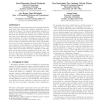Free Online Productivity Tools
i2Speak
i2Symbol
i2OCR
iTex2Img
iWeb2Print
iWeb2Shot
i2Type
iPdf2Split
iPdf2Merge
i2Bopomofo
i2Arabic
i2Style
i2Image
i2PDF
iLatex2Rtf
Sci2ools
101
click to vote
PETRA
2009
ACM
2009
ACM
Design and prototype of a device to engage cognitively disabled older adults in visual artwork
We investigate technological solutions for arts therapists who work with older adults with cognitive disabilities, such as Alzheimer’s disease. We present ethnographic analysis of a survey of arts therapists in the UK and Canada, and show how there is a need for devices that can be used to promote autonomy and independence through engagement with creative visual arts. We then demonstrate a novel device that uses a touch-screen interface, and artificial intelligence software to monitor and interact with a user. Using a probabilistic model, the device monitors the behaviours of a user as well as aspects of their affective or internal state, including their responsiveness and engagement with the device. The device then uses decision theoretic reasoning to take situated actions that promote engagement from the user. We show how the device fits with the ethnographic design, and we give a laboratory demonstration of the functionality of the device. We present and discuss our next steps...
Arts Therapists | Creative Visual Arts | Decision Theoretic Reasoning | Emerging Technology | PETRA 2009 |
| Added | 28 May 2010 |
| Updated | 28 May 2010 |
| Type | Conference |
| Year | 2009 |
| Where | PETRA |
| Authors | Scott Blunsden, Brandi Richards, Jennifer Boger, Alex Mihailidis, Tom Bartindale, Daniel Jackson, Patrick Olivier, Jesse Hoey |
Comments (0)

